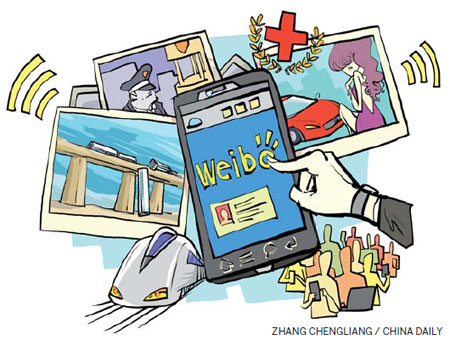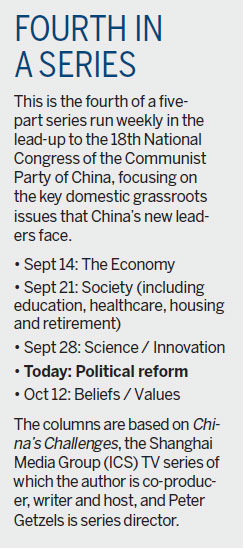New media improves transparency
Updated: 2012-10-05 08:34
By Robert Lawrence Kuhn (China Daily)
|
||||||||


I look back at my more than 20 years going to China and, without doubt, the Chinese people today live far better lives. Both material goods and personal freedoms have never been greater.
But how to make government transparent and accountable? How to provide oversight of the process of governance? How to ensure equality and fairness under rule of law? Call it political reform or call it civil society.
This challenge is what China's new leaders face.
New media is changing China. Microblogs - weibo, China's social media - has become a chief source for getting news and a primary platform for voicing opinion. With microblogs, the Chinese people are more aware of their rights; demand more openness and truth; and are more empowered to seek justice and effect change. The Chinese people can now say "No!"
In 2011, a young woman with the user name of "Guo Meimei Baby" flaunted her riches online, claiming to live in a luxurious villa and drive a Maserati. Supposedly she was working for the Red Cross and China's microblogs erupted with outrage. Although the Red Cross denied any relationship, donations declined sharply - and the incident provoked widespread investigations of State-run charities.
More serious in 2011, two trains collided in Wenzhou, killing 40 and injuring 192. Microblogs enabled the public to ascertain facts and express feelings, even to mobilize doctors, lawyers and engineers. Netizens also criticized the government, accusing officials of "cover-up".
A "kingdom of debate and criticism", as microblogs are called, has appeared in China. With everyone observing, microblogs are a radically new form of public supervision. Guo Meimei affected all Chinese charities. The Wenzhou collision triggered reform of the Ministry of Railways. Other topics include school bus safety and air quality. When millions of users focus on an issue, an influence group is formed. The government must pay attention.
I was touched by the story of Qing Ling, a high school teacher whose personal saga affected all Shanghai. One night, after his cancer-stricken father had been shuttled between hospitals for the fourth time, due to chronic medical shortages, Qing posted an open letter to Yu Zhengsheng, the Shanghai Party secretary. Qing listed many problems, like hospitals discharging dying patients and scalpers selling hospital appointments. Thousands forwarded Qing's letter.
That same evening, Secretary Yu's reply was posted. "I've had a heavy heart since I received Qing Ling's letter," Yu wrote. "When parents and family are suffering from diseases, if we can't help them because of some system defects, we all feel the agony."
Within three months, Shanghai upgraded hospice care, including dedicated hospital beds for terminal patients. Several serious diseases including lung cancer are now covered by medical insurance.
Across China there are more than 20,000 governmental users, such as "Shanghai Publicity", which links many municipal departments. The goal is more responsive social services and better administration. The question is, will citizen expectations - unprecedented and unstoppable - outrun government delivery?
Microblogs, some worry, can spread false information like a contagious disease, which some may exploit. That's the price of freedom - and the cure is more information, not less. There is no turning back. Microblogs give China the chance to create a State system that is open, fair and just.
Transparency. Nothing, in theory, is more vital for political reform.
Little, in practice, is harder to implement. Recently, 92 central government departments and public institutions reported their expenditures online. Earlier, the budgets had been concealed. The required disclosure of "three public consumptions" - overseas trips, vehicle purchases, official receptions - is progress.
Professor Jiang Hong, a relentless advocate of budgetary transparency, has been a deputy to the National People's Congress for 10 years. Citizens, he says, must know how the government spends money and he is not satisfied. To solicit opinions, the budget law draft was published online and received 330,000 comments, the second-largest ever. There are always restrictions on disclosures, Jiang laments. Undaunted, he dares to vote against budget-related regulations. Every year, he and his team rate the transparency of 31 provincial budgets. He says his hair has turned grey in hopes of "sunny finance".
I first appreciated the power of transparency in China's political reform roadmap, when, in late 2007, Politburo member Li Yuanchao, head of the Party Organization Department, explained to me how transparency is the key to "Intra-Party Democracy", which is the core of political reform. Transparency makes citizens more knowledgeable in their opinions and officials more considered in their actions. Both, ideally, create a more self-managed society.
If I had to choose between a multiple party system with deplorable transparency and one-party system with admirable transparency I would choose the latter. This is surely not to say the system is transparent, but it does reflect the view of China's new leaders that to attain such transparency is a vital goal.
While transparency is necessary, it is not sufficient. The old system where "government does all" cannot meet society's ever more complex needs. Government cannot decide all issues, resolve all tensions, settle all disputes - if it tries, it errs. Rather, non-government organizations - NGOs - are emerging to represent public interests and fight for social causes. In the past, in order to register, NGOs required a "patron" government agency. Now, Guangzhou, the capital of Guangdong province, enables NGOs to register directly, increasing the number of NGOs (4,500, as of mid 2012).
NGOs should compete in the marketplace of ideas and issues, just as businesses compete in the marketplace of goods and services. Thus, government is aided in its governance and society is enriched by best practices. NGOs also evince the confidence of leaders to cede certain powers, and the willingness of citizens to stand up and work for what they believe to be right and worthy.
In China, "political reform" has long been a "sensitive" subject, shielded from public discussion. Slowly, cautiously, this is changing. China's new leaders talk about political reform within the context of maintaining one-party rule, and intellectuals debate political reform in comparison with foreign political systems.
China again is at a crossroads of reform. This time, the Chinese people have higher expectations and are not afraid to express their opinions. They will not retreat to a closed society. "Openness, competition, and participation" are watchwords.
Yet most Chinese desire stability and support China's political system - even as microblogs enhance information access, freedom of thought, public opinion, and government transparency. I hear it over and over again: China must find its own way to democracy.
China's goal is to build a "moderately well-off society" and political reform is a necessary part of it.
China's new leaders know they face the challenge of political reform. The Chinese people know it, too.
Dr Robert Lawrence Kuhn is an international corporate strategist and investment banker. He is the author of The Man Who Changed China: The Life and Legacy of Jiang Zemin and How China's Leaders Think (featuring China's new leaders). He is a regular commentator on China (BBC, Bloomberg, CCTV, CNBC and Euronews). The views expressed in the article do not necessarily reflect those of China Daily.
(China Daily 10/05/2012 page8)

 Relief reaches isolated village
Relief reaches isolated village
 Rainfall poses new threats to quake-hit region
Rainfall poses new threats to quake-hit region
 Funerals begin for Boston bombing victims
Funerals begin for Boston bombing victims
 Quake takeaway from China's Air Force
Quake takeaway from China's Air Force
 Obama celebrates young inventors at science fair
Obama celebrates young inventors at science fair
 Earth Day marked around the world
Earth Day marked around the world
 Volunteer team helping students find sense of normalcy
Volunteer team helping students find sense of normalcy
 Ethnic groups quick to join rescue efforts
Ethnic groups quick to join rescue efforts
Most Viewed
Editor's Picks

|

|

|

|

|

|
Today's Top News
Chinese fleet drives out Japan's boats from Diaoyu
Health new priority for quake zone
Inspired by Guan, more Chinese pick up golf
Russia criticizes US reports on human rights
China, ROK criticize visits to shrine
Sino-US shared interests emphasized
China 'aims to share its dream with world'
Chinese president appoints 5 new ambassadors
US Weekly

|

|






